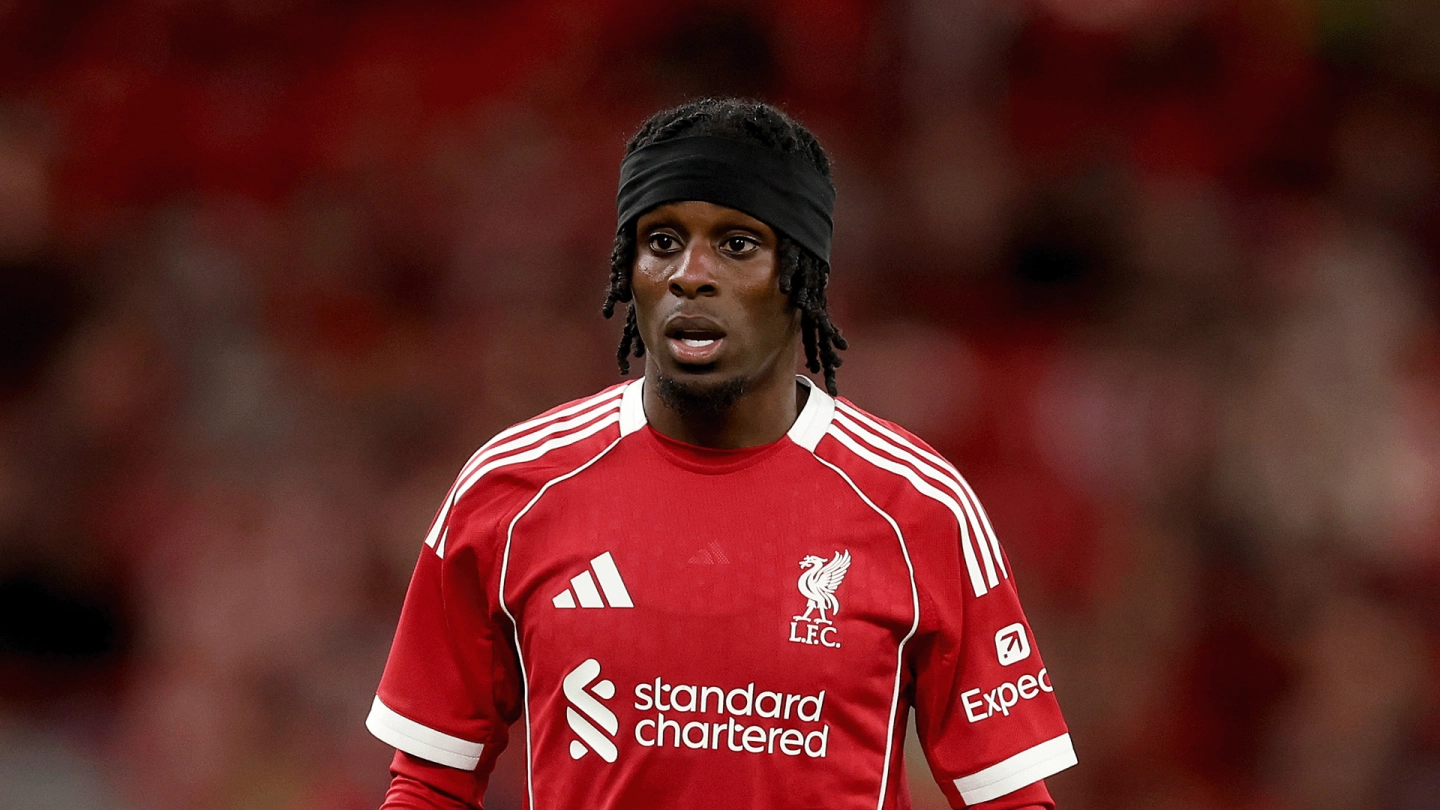LFC injury update: Jeremie Frimpong out, Conor Bradley back in training

As Liverpool FC continues to navigate the demanding early stages of the 2025-26 Premier League season, manager Arne Slot faces his first significant injury crisis in his tenure at Anfield. The latest developments from the club’s training ground present a mixed picture of recovery and setback, with key players experiencing contrasting fortunes in their fitness journeys. This comprehensive analysis examines the current injury situation, its tactical implications, and the strategic options available to the Dutch tactician as Liverpool prepares for crucial fixtures against Newcastle United and Arsenal.
The most concerning development in Liverpool’s injury report centers around summer signing Jeremie Frimpong, whose promising start to his Anfield career has been temporarily derailed by a hamstring complaint. The Dutch right-back’s withdrawal during the 60th minute of Liverpool’s Premier League victory over AFC Bournemouth last Friday has proved more serious than initially anticipated, with medical assessments confirming a significant enough injury to sideline him until after the upcoming international break.
Frimpong’s injury represents a particularly frustrating development given the circumstances of his arrival at Liverpool. The former Bayer Leverkusen defender had been identified as a key component of Slot’s tactical vision, bringing pace, attacking prowess, and defensive solidity to the right flank. His early performances in pre-season and the opening weeks of the campaign had generated considerable optimism among supporters and coaching staff alike, making his absence all the more keenly felt.
Manager Arne Slot was effusive in his praise for the Liverpool medical team’s handling of Frimpong’s injury during the Bournemouth match. The decision to withdraw the player at the hour mark, despite his apparent reluctance to leave the field, has proved prescient in preventing what could have been a more severe and prolonged injury.
“The medical team was completely right about Jeremie to tell me that I had to take him off,” Slot explained during his pre-Newcastle press conference. “I already said immediately after the game that it had nothing to do with how he played, but we felt he had an issue with his hamstring. And with ‘we’ I don’t mean me, but the medical staff. And they were completely right.”
This proactive approach by Liverpool’s medical department demonstrates the club’s commitment to player welfare and long-term fitness management. The decision to prioritize player health over short-term tactical considerations reflects a mature approach to squad management that could prove crucial throughout the demanding season ahead.
The Dutch manager provided clarity on Frimpong’s expected return timeline, confirming that the defender will miss upcoming fixtures against Newcastle United and Arsenal before potentially returning after the international break. This timeframe, while disappointing for Liverpool’s immediate tactical plans, suggests that the injury, while significant, is not of the severity that would threaten the player’s long-term availability.
Slot’s comments indicate confidence in both the medical team’s assessment and Frimpong’s ability to return to full fitness without complications. “So, a good call to take him off, otherwise he would have maybe been out for longer. And we expect to have him back after the international break,” the manager confirmed, providing reassurance to supporters concerned about the defender’s medium-term prospects.
In contrast to Frimpong’s setback, Liverpool received encouraging news regarding Conor Bradley’s recovery from his own fitness concerns. The young Northern Ireland international, who had been ruled out of both the FA Community Shield and the Premier League opener against Bournemouth, has begun his return to full training with the first team.
Bradley’s absence from Liverpool’s early season fixtures had been particularly notable given his impressive development during the previous campaign. The defender’s emergence as a genuine alternative at right-back had provided Slot with valuable tactical flexibility, making his injury-enforced absence a significant blow to squad depth and tactical options
Slot’s comments regarding Bradley’s return reflected the measured approach Liverpool’s medical and coaching staff are taking with the player’s rehabilitation. “Conor trained for a few minutes with us today for the first time,” the head coach reported, indicating that while progress is being made, the club remains committed to ensuring Bradley’s complete recovery before full reintegration.
This cautious approach reflects lessons learned from previous injury management cases and demonstrates Liverpool’s commitment to preventing setbacks that could prolong absence periods. The gradual reintroduction of training activities allows medical staff to monitor Bradley’s response to increased physical demands while minimizing the risk of reaggravation.
Bradley’s return to training, even in limited capacity, provides Slot with additional options as he navigates the challenges posed by Frimpong’s absence. The Northern Ireland international’s familiarity with Liverpool’s tactical system and his proven ability to perform at Premier League level make him a valuable asset as the team prepares for challenging fixtures against Newcastle and Arsenal.
The timing of Bradley’s recovery could prove fortuitous for Liverpool, particularly given the concentrated fixture schedule that characterizes the early stages of the Premier League season. His potential availability for selection provides tactical flexibility that could prove crucial in maintaining competitive performance levels across multiple competitions.
Liverpool’s injury considerations extend beyond the right-back position to include the management of Joe Gomez’s return from his pre-season injury concerns. The versatile defender’s successful reintegration during the second half of the Premier League opener against Bournemouth provided encouragement, though Slot remains cautious about the pace of his full return to regular action.
Gomez’s ability to operate effectively across multiple defensive positions makes him a particularly valuable asset for Liverpool, especially given current injury concerns in specific positions. His experience and tactical intelligence provide Slot with a reliable option as the team navigates early season challenges.
Slot’s assessment of Gomez’s current fitness levels reflects the complex balance between player welfare and tactical necessity that characterizes modern football management. The manager’s acknowledgment that Gomez’s 20-minute appearance against Bournemouth represented “quite a lot” for a player returning from injury demonstrates the careful consideration being given to his rehabilitation process.
“I wouldn’t say he had a setback but he wasn’t able to train three days in a row completely with the team,” Slot explained, providing insight into the gradual nature of Gomez’s return to full fitness. This transparency regarding player conditions helps contextualize selection decisions and manages expectations regarding availability.
The manager’s comments suggest that while Gomez is progressing well in his recovery, decisions regarding his involvement against Newcastle will depend on his response to training throughout the week. This flexible approach allows for optimal utilization of the defender’s capabilities while prioritizing his long-term fitness and availability.
Liverpool’s current injury situation has highlighted both the challenges and opportunities presented by positional injuries in modern football. Slot’s acknowledgment of various players’ ability to operate in unfamiliar positions demonstrates the tactical flexibility that has become essential in contemporary squad management.
The manager specifically mentioned several players capable of fulfilling right-back duties, including Wataru Endo, who “played in that position for a few minutes,” and Dominik Szoboszlai, who “already played in that position.” This tactical adaptability provides Liverpool with options despite the concentration of injuries in specific positions.
Slot’s comments regarding squad construction philosophy provide insight into Liverpool’s approach to player recruitment and squad balance. His observation that “you cannot prepare for two injuries in one position, it would be stupid for us to have three full-backs or five left-backs” reflects the practical realities of modern squad building while highlighting the unexpected nature of current circumstances.
Interestingly, the manager noted that Liverpool currently possesses “three left-backs,” demonstrating how squad construction can sometimes result in imbalanced depth across positions. This situation underscores the unpredictable nature of injury management and the importance of tactical flexibility in compensating for positional shortages.
The absence of Frimpong, known for his attacking contributions from the right-back position, may necessitate tactical adjustments to Liverpool’s offensive approach. The player’s pace and crossing ability had been identified as key components of Slot’s tactical system, making alternative solutions crucial for maintaining attacking effectiveness.
Potential solutions include increased attacking responsibility for central midfielders, greater involvement from right-sided wingers in creative phases, or the deployment of more attack-minded alternatives in the right-back position. Each option presents distinct advantages and challenges that Slot must carefully consider based on opponent analysis and available personnel
Frimpong’s injury represents the loss of a player specifically recruited to fulfill a particular tactical role within Slot’s system. The defender’s profile as a modern attacking full-back, comfortable in both defensive and offensive phases, had made him an integral component of Liverpool’s summer transfer strategy.
His absence removes a player capable of providing width in attacking phases while maintaining defensive solidity when required. The combination of pace, technical ability, and tactical intelligence that Frimpong brings to Liverpool’s setup cannot be easily replicated through positional adjustments, making his injury particularly impactful.
Bradley’s injury concerns have interrupted what had been a promising development trajectory for the young defender. His emergence during the previous season as a credible first-team option had provided Liverpool with valuable squad depth while offering the player crucial experience at the highest level.
The Northern Ireland international’s return to training represents not just a boost to Liverpool’s immediate options, but also the continuation of an important developmental journey. His experiences with injury management and recovery will contribute to his overall maturation as a professional footballer.
Gomez’s situation illustrates the particular value of versatile defenders in modern football squad construction. His ability to operate effectively across multiple positions provides tactical solutions that extend beyond simple position-for-position replacements.
The defender’s experience and tactical understanding make him particularly valuable during periods of squad disruption. His potential availability for selection against Newcastle could provide Slot with tactical options that might not otherwise be available given current injury circumstances
Liverpool’s handling of recent injury concerns demonstrates the evolution of medical departments in professional football. The decision to withdraw Frimpong despite minimal obvious signs of distress reflects sophisticated monitoring systems and medical expertise that prioritizes long-term player health over immediate tactical considerations.
This proactive approach represents best practice in sports medicine and injury prevention. The ability to identify potential problems before they become severe injuries can significantly impact player availability and performance throughout the season.
The varied approaches to player rehabilitation visible in current injury management cases demonstrate Liverpool’s sophisticated understanding of individual recovery requirements. Each player’s situation has been managed according to specific circumstances, reflecting personalized medical care that optimizes recovery outcomes.
This individualized approach extends beyond simple injury treatment to encompass broader fitness management, training load monitoring, and return-to-play protocols that prioritize sustainable performance over short-term availability
Liverpool’s upcoming fixtures against Newcastle United and Arsenal present distinct challenges that will test Slot’s ability to adapt to current injury circumstances. Both opponents possess qualities that could exploit potential weaknesses in Liverpool’s defensive setup, making tactical preparation crucial.
Newcastle’s attacking approach and Arsenal’s technical quality will require different defensive strategies, potentially necessitating varied solutions to the right-back position across both matches. Slot’s tactical acumen will be tested as he balances available personnel with optimal tactical setups for each opponent.
The international break following these fixtures provides a natural recovery period that could prove crucial for Liverpool’s injury management strategy. The timing allows for extended rehabilitation periods while potentially facilitating the return of key players for subsequent fixtures.
This schedule consideration influnces immediate selection decisions and tactical approaches, as Slot must balance current performance requirements with longer-term squad management objectives. The strategic use of available players during this period could prove decisive for Liverpool’s early season momentum.
Liverpool’s current injury situation presents both challenges and opportunities that will test the club’s depth, tactical flexibility, and management expertise. While the absence of key players like Frimpong creates immediate difficulties, the return of Bradley and the potential availability of Gomez demonstrate the squad’s resilience and adaptability.
Arne Slot’s handling of these early challenges will provide valuable insights into his management philosophy and tactical flexibility. The Dutch coach’s measured approach to injury management, combined with his tactical innovations in addressing positional shortages, suggests that Liverpool remains well-equipped to navigate current difficulties while maintaining competitive performance levels.
The situation ultimately reinforces the importance of squad depth, medical excellence, and tactical versatility in modern football. Liverpool’s response to these challenges will likely influence both immediate results and longer-term squad development strategies, making this period particularly significant for the club’s seasonal aspirations.
As Liverpool prepares for crucial fixtures against Newcastle and Arsenal, the integration of returning players and tactical adaptation to injury circumstances will determine the success of Slot’s early tenure. The manager’s ability to extract maximum performance from available personnel while managing recovery processes effectively will prove crucial for maintaining Liverpool’s competitive edge throughout this challenging period.















